Dental Implants – Lenox, MI
A Modern Answer for Missing Teeth
Have you lost a single tooth? Several teeth in a row? All of the teeth in your upper and lower jaw? In all of these situations, Dr. Young and Dr. Samona can use dental implants to completely rebuild your smile, allowing you to enjoy fully functional new teeth that will help you speak more clearly, eat more kinds of foods, and get more enjoyment out of life as a whole. You can call to set up a free consultation with us if you would like to learn more about dental implants in Lenox and the advantages they offer.
Why Choose Forever Young Dentistry Bayside for Dental Implants?
- Complimentary Consultation for Dental Implants
- State-of-the-Art Treatment Planning Technology
- Reliable Implant Posts Made from Various Materials
What Are Dental Implants?
A dental implant might look like a screw, but it’s actually meant to act as an artificial root for your replacement teeth. Each post is directly inserted into a carefully chosen spot in your jawbone. After a few months, the implant post will fuse with the surrounding bone tissue via osseointegration. A metal abutment will be used to attach your replacement teeth to your implants.
Based on your needs and preferences, your dental implant posts might be made out of titanium, ceramic, or zirconia.
The 4-Step Dental Implant Process
You don’t need to go to a different practice to have your dental implants placed because our reliable dental team can handle everything in-office. We’ll always customize the treatment process based on your needs, but there are four major steps that we always need to follow regardless of how many implants are required. Here is what you can expect.
Initial Dental Implant Consultation

Everything begins when you first visit our office. We can figure out whether you’re a viable dental implant candidate and set up any preliminary treatments you may need. This could include bone grafting, gum disease treatment, or a sinus lift depending on the current state of your smile and surrounding areas. Once your jaw and gums are in great shape, we can continue moving forward with your treatment.
Dental Implant Surgery

At Forever Young Dentistry Bayside, we are proud to complete the entire dental implant process at our practice, so you don’t need to work with an outside specialist. A guide will be used during dental implant placement, which lowers the risk of unexpected complications occurring during the process. After the area is numbed with a local anesthetic, an incision is made in the gum tissue. Then, the implant is placed at a precise angle in the jaw. The gums are closed, and a protective cap is placed over the post to keep it protected as it heals.
Dental Implant Osseointegration & Abutment

About 3 to 6 months are needed for the implants to finish joining with the jawbone. This process is called “osseointegration.” Then, you will need to get another minor procedure where the abutments are placed onto your implant posts. Impressions are taken so your restoration can be customized to fit your unique smile.
Delivery of Dental Implant Restoration

Finally, we will design your replacement teeth and use the implants to firmly anchor them to your jaw. We will then examine your smile to ensure that everything looks and feels as it should. Then, you will be sent on your way to show off your new and improved smile!
Benefits of Dental Implants

What kind of dental issue are you suffering from? How severe is it? What kind of treatment do you need? The answers to these questions will help determine the overall price of your emergency endodontic care. Don’t worry; you won’t have to move forward with any procedures before you have an idea of how much you will need to pay for them. On top of that, our team is willing to work with you to help make your treatment as affordable as possible.
Day-to-Day Benefits

Dental implants do more than just replace missing teeth. They also offer patients considerable benefits for their quality of life, including:
- Lasting for three decades or more with good maintenance. In many cases, dental implants last for a lifetime.
- Making you look younger and helping you feel more confident by completing your smile and preventing the jaw from receding.
- Allowing you to eat all kinds of foods that traditional restorations like dentures have difficulty chewing, such as steak, crunchy fruits and veggies, and corn-on-the-cob.
- Being very easy to clean, as they only require the same oral hygiene routine as natural teeth.
Health Benefits
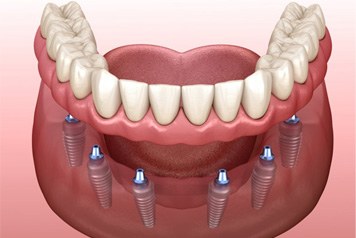
Dental implants can be an excellent way to improve a patient’s oral and overall health, as they offer dramatic benefits like:
- Keeping the underlying bone healthy and strong by stimulating the jaw to prevent it from receding.
- Preventing your remaining teeth from shifting out of place as the atrophying jaw changes shape.
- Allowing the patient to enjoy a nutritious diet of many different types of food, helping the body stay healthy and fit for decades to come.
- Since dental implants are surgically fixed in place, dental bridges and dentures secured with them cannot slide out of position to irritate and cause sores in the surrounding soft tissues of the mouth.
Long-Term Benefits

Dental implants are a sound long-term investment in your future health and confidence that can vastly improve your daily experience. A few great reasons to consider getting them include:
- Dental implants boast an impressive 95% success rate even ten years after placement.
- Dental implants can last for decades with excellent care, so they will not require regular replacement like dentures or dental bridges.
- Since dental implants work just like real teeth after being placed, they can save you a lot of money by not requiring replacement or special maintenance like other tooth replacement options.
Who Dental Implants Can Help

Dental implants have skyrocketed in popularity largely because they are the only tooth-replacement option that replaces both the root and crown. Of course, they are also widely loved and used because they can replace one, a few, or an entire arch of missing teeth. In other words, if you are ready to address tooth loss head-on with dental implants, don’t hesitate to schedule an appointment with our Lenox dental team to find out if you’re a candidate. In the meantime, you can read on to learn more.
Who Is a Good Candidate for Dental Implants?

In order to find out if you’re a good candidate for dental implants, our team at Forever Young Dentistry needs to conduct a comprehensive oral exam. That way, we can determine the density of your jawbone, see if any preliminary procedures, like a tooth extraction, are necessary, and make sure you’re willing to commit to good oral hygiene habits both now and in the future.
If you aren’t a candidate for dental implants, don’t worry – that doesn’t mean that you’ll just have to accept the consequences of tooth loss. We will review the other treatment options, like traditional dentures, with you to ensure that you have a complete, healthy, and beautiful smile again.
Missing One Tooth
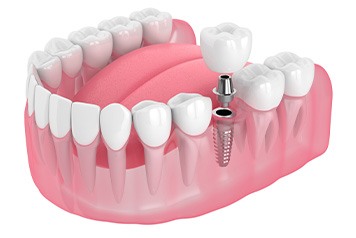
If you are missing one tooth – whether it’s one of your molars or one of the teeth that show when you smile – dental implants are an option. In fact, we can replace both the root and the crown of your tooth, ensuring your restoration looks and feels just like the real thing. One of the best parts is that – with proper care – the results can last for 30+ years. So, if your confidence and diet have been restricted following tooth loss, don’t wait any longer; schedule a consultation with us to discuss dental implants!
Missing Multiple Teeth
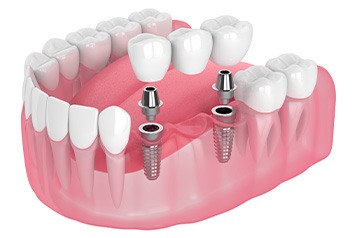
Are you missing 2-4 teeth in a row? Are you missing several teeth throughout your mouth? If so, you’ll be happy to know that we have a solution for you: dental implants! With this state-of-the-art solution, we can replace several teeth consecutively or multiple teeth throughout your mouth. Since they are inserted directly into your jaw, you don’t have to worry about unexpected slipping either. They will stay securely in place while you’re laughing, eating, or talking.
Missing All Teeth
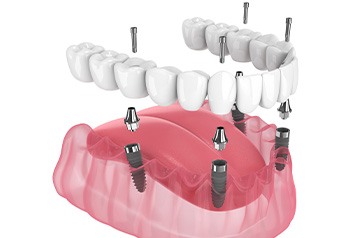
If you don’t have any of your natural teeth left, implant dentures might be the solution you’ve been looking for. Like traditional dentures, implant dentures can give you a completely new smile. However, there is one important difference: they are secured in place with strategically placed implants. This adds to their lifelike appearance, restores some of the strength of your bite that was lost, and boosts their longevity. So, don’t just assume traditional dentures are your only option – ask us about implant dentures!
Understanding the Cost of Dental Implants

Even if you favor implants, you likely want to know their price first. (A treatment only helps when it fits your budget.) Still, the cost of dental implants varies by patient. You’ll need to consult our dentists to get a more precise estimate. From there, our team will work to make your care affordable. We’ll even walk you through the relevant pricing factors and payment options. For more details, just keep reading or call our office soon.
Preliminary Treatments & Dental Implant Surgery

Firstly, some patients need preliminary services before implant surgery. These procedures may include bone grafts, gum disease therapy, or even tooth extractions. If you require them, they’ll add to your treatment expenses. That said, they’d serve a vital purpose: Ensuring your new smile’s success. Plus, most dental plans partially cover them.
Furthermore, implant surgery incurs its own cost. This amount is shaped by your implant’s location, anesthesia, etc. Fortunately, our office performs this treatment wholly in-office. You won’t have to worry about paying an outside surgeon.
The Parts of Your Dental Implant

Of course, the actual implant features also affect your treatment cost. The most common of these are:
- Implant Number – In most cases, placing more implants means higher expenses. Notably, though, an implant denture is more cost-effective than replacing each tooth separately.
- Implant Size/Material –Implants often come in different sizes and materials. For example, zirconia ones cost more than titanium kinds. Similarly, long implants are pricier than short ones.
- Implant Brand – Different manufacturers make implants differently, so one provider may charge more for their stock than another.
- Restoration Type – Crowns, bridges, and dentures have different prices. The smaller of these restorations are generally less expensive.
How Dental Implants Can Save You Money

Because dentures and bridges have low upfront costs, you may think they’re the better choices. However, dental implants will save you money in the long run.
For starters, implants often lack long-term expenses. Due to their long lifespans, they need few (if any) repair visits. The restorations also don’t require adhesives to work. Patients can typically care for them without buying pricey tools.
More crucially, implants are good for oral health. They won’t wear down your teeth or irritate your gums. Even better, they’re as easy to clean as natural teeth. So, implants will lower your odds of having to treat costly oral issues (i.e., tooth decay, gum disease, etc.).
Does My Dental Insurance Cover Dental Implants?

Sadly, dental insurance normally won’t cover implants. Most policies see the restorations as medically unnecessary. Therefore, patients must often pay for them out-of-pocket.
On the bright side, exceptions do exist. Your plan may well offer partial coverage. Given that fact, confirm your policy’s benefits before care. Our office can even help you do so.
Making Dental Implants Affordable

Aside from insurance, other methods can make implants affordable. Notable among them are a dental practice’s payment options. With the right one, your future implants will be budget-friendly.
For instance, consider our own practice. We provide:
- In-House Membership Plans – For a flat annual fee, our membership plan offers a discount on dental implants.
- CareCredit Financing – We happen to work with CareCredit, a third-party financier. They’d let you pay for implants in monthly installments.
In the end, we’re eager to give you effective and affordable implants. Learn more about financing them with a consultation at our office!
Dental Implants Post-Op Instructions

Whatever you may have thought, the dental implant process doesn’t end with the placement surgery. Your mouth needs to heal after our dentists place the metal posts; you won’t get good results otherwise. Fortunately, our practice can help you recover with great dental implant post-op instructions in Lenox. If you stick to these rules, you should enjoy your replacement teeth much more quickly. Learn them in detail by reading below or visit us in the coming days!
What to Do Directly After Dental Implant Surgery

Right after your dental implants are placed, you need to leave the forming blood clot alone. Doing so ensures you won’t have major delays in your recovery. With that said, remember to follow these rules:
- Keep your fingers and tongue away from the surgical site(s) for a few days.
- Don’t spit; swallow your saliva or use a tissue for dabbing instead.
- Avoid smoking during the first day after your surgery.
- Since suction can dislodge blood clots, don’t use drinking straws for a while.
Common Side Effects When Recovering from Dental Implant Placement

While you recover from placement surgery, you may face some mild side effects. These could include the following:
- Facial or Gum Swelling – Your gums may swell in the first 72 hours after surgery. If they do, please apply a cold compress.
- Mouth-Related Discomfort – The treatment site could ache once the surgery’s anesthesia wears off. In that case, use store-bought pain relievers to ease your discomfort.
- Intermittent Bleeding – Your implant site could bleed a little after the placement. Apply gauze and light pressure to reduce such symptoms.
Rest assured that the symptoms above are temporary; they should fade after a few days. If they don’t or get worse, please contact our office.
Your Diet After Dental Implant Surgery

To heal smoothly from dental implant surgery, stick to soft and non-abrasive foods for a few weeks. Tough meals would likely dislodge your blood clot, delaying your overall recovery.
Some of the best foods to include in this temporary diet are:
- Yogurt
- Soft Cheese
- Scrambled Eggs
- (Non-hot) Soup
- Mashed Potatoes
- Pasta
- Pudding
- Sweet Potatoes
- Smoothies
- Ice Cream
Most patients can eat normally again once they’re up to it. Still, we do suggest limiting your intake of crunchy/tough foods and not chewing directly on the implant site.
Post-Op Health & Oral Hygiene

You should continue to practice good oral hygiene as you recover. Still, make sure to include these tricks as part of the process:
- Be careful of the surgical site(s) when brushing your teeth twice daily.
- If possible, rinse your mouth with salt water 2-3 times daily. You could also do oral rinses with a prescription mouthwash.
- Avoid using a mouthwash with high alcohol levels (i.e., Scope, Listerine, etc.).
What to Do After Your New Teeth Are Attached

Once your new crown, bridge, or denture is attached, the hard part of your treatment is over! The most you’ll face from that point is some slight gum sensitivity – a symptom you can manage with painkillers. In other words, you won’t have major symptoms like swelling, bleeding, or a long recovery time. Instead, you can go out and enjoy your fully-restored grin!
Maintaining & Caring for Your Dental Implants

Replacing your lost teeth with dental implants can help your smile stay strong, complete, and healthy for life, but they’re going to need excellent care to last that long. Luckily, these remarkable prosthetic devices don’t require any more care to stay healthy than natural teeth. Here’s a brief guide to how you can keep your implants in excellent shape from the team at Forever Young Dentistry.
Make Oral Hygiene a Priority

While dental implants are immune to the bacteria that cause cavities, it’s still important to practice excellent oral hygiene to preserve your remaining teeth and keep your gum tissue and jawbones healthy. Oral infections such as gum disease make implants more likely to fail, so remember to stick to a daily regimen that includes brushing, flossing, and rinsing with antibacterial mouthwash to eliminate harmful germs and food debris.
Eat a Healthy Diet

While dental implants can handle all the same foods as natural teeth, it’s still important to make smart eating decisions to protect them from damage and ensure that the body has the nutrition it needs to keep them healthy. Overindulging in sticky, crunchy, or sugary foods can lead to injuries of your dental implants or infections in the tissues supporting them. After receiving implants, be sure to get plenty of calcium and vitamin C to keep your jaws and gums strong and healthy.
Break Bad Habits

Many people habitually chew on non-food items like writing utensils, paperclips, or toothpicks or use their pearly whites to open packages or bottles, and these are excellent ways to seriously damage your natural and artificial teeth. Remember to only use your teeth for speaking, smiling, and chewing to prevent chips, cracks, and fractures. Smoking and excessive alcohol use inhibit the ability of the gums to heal and fight infections, so refraining from these habits can help your dental implants last much longer.
Protect Your Dental Implants
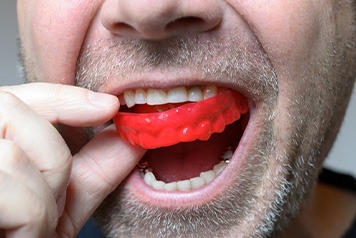
While dental implants are incredibly strong and durable, they are still vulnerable to oral trauma. Remember to wear an athletic mouthguard to prevent injuries when playing sports or riding a bike, and wear a nightguard to bed if you reflexively grind your teeth in your sleep.
Schedule Regular Dental Checkups

Even if you have replaced all of your natural teeth with dental implants, it’s still important to see us at our Lenox office for routine exams and cleanings at least twice a year. This allows one of our skilled dentists to monitor your oral health, address issues in their early stages, and advise you as to better oral hygiene at home. These visits are crucial for your oral and overall health and play a key role in keeping your dental implants healthy for as long as possible.
All-on-4 & All-on-X Implants

The All-on-4 and All-on-X dental implant procedures are somewhat similar to traditional dental implant placement. However, the implant posts are inserted at specific angles so that they can give your new teeth a sturdier foundation. This helps reduce the number of dental implant posts that are needed overall. Additionally, many All-on-4 and All-on-X patients can get new teeth on the day of their dental implant surgery. Feel free to ask us about All-on-4 or All-on-X if you’ve lost a full arch of teeth.
Learn More About All-on-4 Dental Implants
Screw-Retained Dental Implants

In some cases, we can attach your final restoration to your dental implants with a screw. One of the biggest advantages of screw-retained dental implants is that they make it very easy to remove your restoration in case it needs to be taken out of your mouth for whatever reason.
Sinus Lifts

A sinus lift may be required if you need dental implants to replace the teeth near the back of your mouth in your upper jaw. Your sinus cavity will be gently lifted, creating space that can be filled with bone grafting material. Not only does this provide more bone to support the implant posts, but it also ensures that your sinus cavity is safely out of the way during placement.
Bone Grafts

Oftentimes a bone graft needs to be performed as part of the dental implant process if there isn’t enough bone density in your jaw. We can strengthen and rebuild your jawbone using bone tissue that can either be taken from a donor or from your own body. A certain level of bone is needed before your jaw can successfully support dental implants.
Dental Implant FAQs
Does Getting Dental Implants Hurt?
Before beginning the dental implant procedure, our team will first numb your mouth with a local anesthetic so that you don’t feel any pain throughout your appointment. You will likely also be provided with sedation dentistry so that you can experience a more relaxing and pleasant experience while undergoing the process. Furthermore, the jawbone doesn’t have many nerve endings, which can further decrease the likelihood of feeling pain during your treatment. Following your surgery, you’ll normally experience some discomfort or soreness. Make sure to take over-the-counter or prescribed pain medications as well as use a cold compress to help make yourself more comfortable while you recover. If any discomfort worsens after around three days, notify our team right away for help.
How Long Does It Take to Recover From Dental Implant Surgery?
It can usually take about three to six months for your dental implants to integrate with your jawbone completely. That said, patients can typically expect to return to their usual daily activities the day after their surgery. Of course, you’ll need to take certain precautions to prevent any discomfort or disturbing the surgical site while it heals. This usually involves refraining from strenuous exercise for at least the first week or so, since this can end up interfering with your recovery. You might expect intermittent bleeding for the first couple of days, but it shouldn’t last longer than three to four. Feel free to take prescribed or OTC pain relievers as instructed on the label. Reach out to our team if you notice any abnormalities during your recovery so that we can provide the treatment you need to get you back on track.
Is There Anything I Shouldn’t Eat with Dental Implants?
While your dental implants will be able to help you regain a large majority of your natural biting power, the first couple of weeks after your placement surgery will require you to avoid foods that are tougher to chew. Additionally, you should refrain from drinking acidic, alcoholic, and sugary beverages. DO NOT use a straw, as the suction can end up disturbing the surgical site. Once your implants have properly fused to your jawbone, you should be able to eat nearly all of your favorite foods. Do be cautious of foods that are particularly sticky/chewy, as they can potentially dislodge or loosen your restoration(s).
What Can Cause Dental Implants to Fail?
The biggest suspect of dental implant failure is peri-implantitis, which is a form of gum disease that targets the connective tissues holding the titanium post in position. Second to that would be failed osseointegration, meaning the implants weren’t able to properly fuse with your jawbone to provide a stable foundation for your restoration(s). Other reasons may involve tobacco use, radiation to the head and neck, chronic teeth grinding, poor oral hygiene, certain medications, and particular health conditions (diabetes, osteoporosis, autoimmune disorders, cancer, etc.). Our team will provide you with guidelines on how to significantly reduce your risk of implant failure before and after your treatment.

